Ponting Surname Ancestry ResultsOur indexes 1000-1999 include entries for the spelling 'ponting'. In the period you have requested, we have the following 112 records (displaying 81 to 90): Single Surname Subscription | | | Buying all 112 results of this search individually would cost £634.00. But you can have free access to all 112 records for a year, to view, to save and print, for £100. Save £534.00. More... |
These sample scans are from the original record. You will get scans of the full pages or articles where the surname you searched for has been found. Your web browser may prevent the sample windows from opening; in this case please change your browser settings to allow pop-up windows from this site. Boys entering Clifton College
(1900)
Clifton College near Bristol was established in 1862. This edition of the Clifton College Annals and Register for the Old Cliftonian Society by F. Borwick was published in 1925. Boys are listed alphabetically by term of entry, with full names, surname first, in bold. Father's (or widowed mother's) name is given (surname and initials) in capitals, and address. Then there is the name of the house (N. T., North Town; S. H., School House; S. T., South Town), first and last forms, distinctions in school work and games, and month of leaving. Where known, the editor then gave a career summary with month of death; or, if still living, address as in 1925 (in italics).PONTING. Cost: £4.00.  | Sample scan, click to enlarge
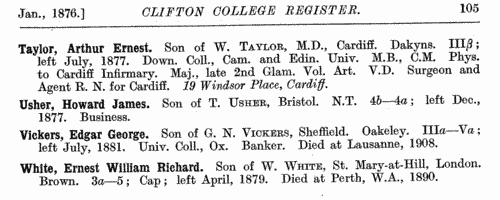
| Boys entering Giggleswick School
(1900)
The school at Giggleswick in the West Riding of Yorkshire dates from at least 1507, but no register of the boys attending there has survived earlier than one started by the headmaster, the reverend George Style, in 1875. When the bursar, H. L. Mullins, prepared this, 'The Giggleswick School Register', printed in 1913, he was able to compile general details of some scholars from earlier years, but the concerted, reasonably complete, account starts in 1859. The details are arranged by term of entry, then alphabetically by surname and christian name. Typically each description gives full name; date of birth; name and address of father; date of leaving. Where known, Mullins then added a brief career synopsis, present address in 1913, or date of death. From 1869 onwards boarders were admitted to the school, and where it is known that a boy was a day scholar, the word (Town) is added after his name.PONTING. Cost: £4.00.  | Sample scan, click to enlarge
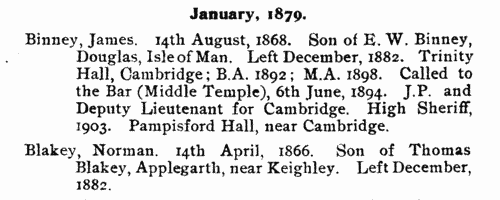
|  British artillerymen fighting in South Africa
(1899-1902) British artillerymen fighting in South Africa
(1899-1902)
The Queen Victoria's South Africa Medal was awarded (after her death, in the event) to all who had served honourably in the various campaigns in the Boer War. Returns were made from each unit, and consolidated into nominal roll, of which this is the one for the Royal Artillery. Confusingly, the ledgers used had originally been printed for a register of men transferred (or re-transferred after mobilization) to 1st Class Army Reserve. All the original column headings were therefore struck through, and the roll was prepared with this information: Date of Issue; Regimental Number; Rank; Name; Unit; Medal (a 1 indicating that a medal was awarded); [number of] Clasps; the reference to the source in the original returns, usually starting with AG for papers in the hands of the Adjutant-General, and 68/Art/ for the Royal Artillery records. The final column, normally left blank, was occasionally used for explanatory remarks.PONTING. Cost: £8.00.  | Sample scan, click to enlarge
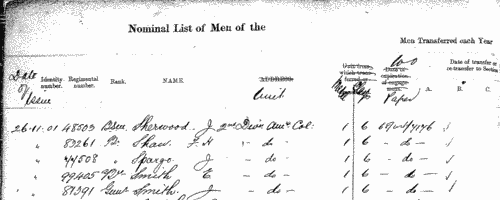
| Fellows of the Institute of Bankers
(1904)
The Journal of the Institute of Bankers for 1904 includes a list of Fellows (from which this scan is taken: an asterisk indicates a Life Fellow), of Associates (an asterisk indicates a Life Associate, and a dagger a holder of the certificate of the institute), and of Ordinary Members; there are also results of the institute's final examinations held from 11 to 13 April, in which the successful candidates are listed alphabetically by surname and full christian name(s), with the name and address of their bank (not their personal addresses). These final examinations entitled the successful candidates to the Certificate of the Institute of Bankers; those who obtained distinctions are so indicated in the lists (an asterisk for Commercial Law, dagger for Arithmetic and Algebra, double dagger for Practical Banking, double s for Commercial Geography and History, and double vertical line for Political Economy). There was also an examination taken after the Gilbart Lectures, with successful candidates being awarded money prizes, or certificates of distinction, or honour, or merit, and similar lists of these awards were also printed in the journal.PONTING. Cost: £6.00.  | Sample scan, click to enlarge

|  Queen's South Africa Medal: Royal Field Artillery: 85th Battery
(1901-1905) Queen's South Africa Medal: Royal Field Artillery: 85th Battery
(1901-1905)
The nominal roll for the Queen Victoria's South Africa Medal - awarded (after her death, in the event) to all who had served honourably in the various campaigns in the Boer War - was compiled from these returns from the individual units. Two sets of form were completed. The main one, as in the sample scan, dates from 1901 and gives regimental number, rank, and full name (surname first), followed by a series of columns relating to different actions - Belmont, Modder River, Paardeberg, Dreifontein, Wepener, Johannesburg, Diamond Hill, Belfast, Wittebergen, Defence of Kimberley, Relief of Kimberley, Defence of Mafeking, Relief of Mafeking, Cape Colony, Orange Free State, Transvaal, Rhodesia, Talana, Elandslaagte, Tugela Heights, Defence of Ladysmith, Relief of Ladysmith, Laing's Nek, and Natal; each entitled the man to a separate clasp to the medal, and a tick or a Yes in the appropriate column indicates the man's actual physical presence in that battle. A final column for remarks is important in those cases where the man was no longer in the unit, by removal, death or desertion. The second form that sometimes occurs was returned in 1905, and covers men entitled to the Second South African War Medal and Clasps. It lists men by number, rank and name, checks whether they had claimed the Queen's South Africa Medal, and then enquires as to their suitability as to three Colony Clasps, which could be awarded for service in the Cape, Orange Free, or Transvaal; whether entitled to Date Clasps (South Africa 1901 and South Africa 1902); whether also entitled to the King's South Africa Medal; any other corps in which served in South Africa; and remarks (such as becoming non-effective, forfeiture, &c.) WO 100/143PONTING. Cost: £8.00.  | Sample scan, click to enlarge

| Killed in action at Jutland Bank
(1916)
Roll of the officers and men of the Royal Navy killed in action at Jutland Bank, 31st May 1916PONTING. Cost: £6.00.  | Sample scan, click to enlarge
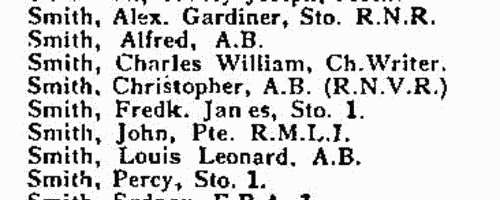
| Roll of Honour: London Firemen
(1914-1918)
The London County Council published a 'Record of Service in the Great War 1914-1918 by Members of the Council's Staff' in 1922. This included a complete list, department by department, of the over 7000 staff who had served in the armed forces during the war, those dying while on active service being marked with an asterisk. The entries give full name, surname first, in bold, the years in uniform, any decorations, rank, and a brief description of theatre in which engaged. PONTING. Cost: £6.00.  | Sample scan, click to enlarge

| Boiler Makers and Iron and Steel Shipbuilders: Swindon (1921)
The monthly report of the United Society of Boiler Makers and Iron and Steel Shipbuilders contains, as well as internal union business, reports of meetings; obituaries; warnings about named individuals falling into arrears, or becoming 'out of benefit'; members 'run out'; subscription sales; new members admitted; second class transferred to first class membership; apprentices admitted; apprentices transferred to adult membership; and 'unapproved' apprentices. Members are normally identified by surname and initial, with membership number as appropriate. These abbreviations also occur: 1st, first class; 2nd, second class; 3rd, third class; A.I.S., angle iron smith; App., apprentice; A.W., acetylene worker; C., caulker; D., driller; H-up, holder-up; P., plater; R., riveter; S.I.W., sheet iron worker. January 1921
PONTING. Cost: £8.00.  | Sample scan, click to enlarge
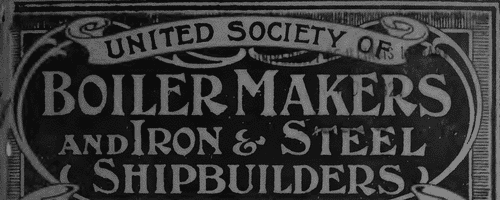
| Boys entering Marlborough College
(1923)
The public school at Marlborough in Wiltshire was founded in 1843. In 1952 this, 9th, edition of the college register was published, being a revision by L. Warwick James of the 8th edition (of 1936): but for the years before 1936 it does not merely repeat the 8th edition, because Warwick James was able to correct the 19th-century entries with information from newly-discovered letters and books from 1843 to 1853, and the school lists from 1844 onwards. The roll is arranged by year, and within each year by term of entrance, and then alphabetically by surname within each term. Each boy is assigned a number within the year: then his name is given, surname first, and, in brackets, his house. The houses within the college were called B1, B2, B3, C1, C2 and C3, and the Lower School (L Sch); the out college houses were Preshute, Priory, Cotton, Hermitage, Littlefield, Barton Hill, Summerfield and Upcot. Then there is given the boy's father's name (surname and initials) and address (at entrance), the boy's date of birth (b) and month of leaving (l). Where the boy represented the school at Rugby football (XV) or cricket (XI), in the rifle corps (VIII, or RC XI), that is indicated. There is a brief summary of achievements in later life, and, where known, and date of death or (in italics) address as in 1952. PONTING. Cost: £4.00.  | Sample scan, click to enlarge
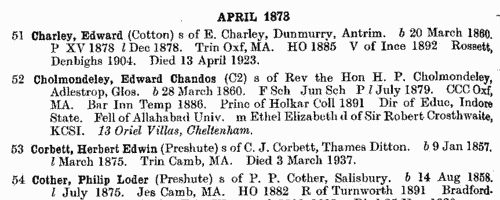
| Wanted by the police in Hampshire
(1923)
The Police Gazette was published by Authority by the London Metropolitan Police, and circulated, as confidential, to the police forces throughout Britain and Ireland. The contents were based on the information routinely submitted to the Criminal Record Office. One of the regular features was a section entitled Apprehensions Sought, in which each police force gave details of people for whom arrest warrants had been issued and were now on their Wanted list. The details given are: the name of the police authority (in bold) seeking an arrest; a brief description of the crime; the suspect's full name (in bold); C. R. O. number, year of birth, height, complexion, hair colour, eye colour, distinguishing marks such as scars; clothing &c. There then follows a resume of previous convictions. Variations of surname spelling and aliases are noted in the descriptions, and these variants and aliases have also been indexed.PONTING. Cost: £6.00.  | Sample scan, click to enlarge
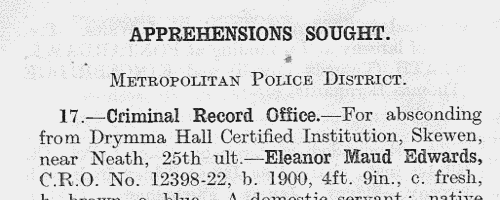
|
Research your ancestry, family history, genealogy and one-name study by direct access to original records and archives indexed by surname.
|













